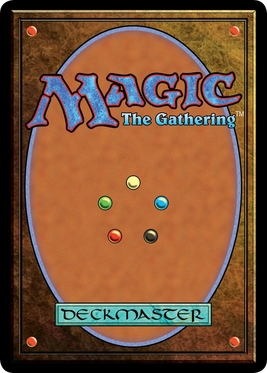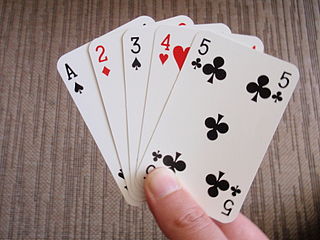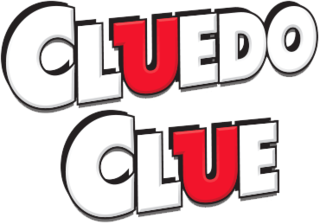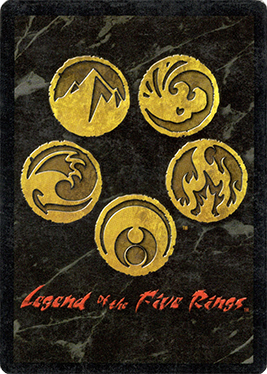Related Research Articles

Magic: The Gathering is a tabletop and digital collectible card game created by Richard Garfield. Released in 1993 by Wizards of the Coast, Magic was the first trading card game and had approximately thirty-five million players as of December 2018, and over twenty billion Magic cards were produced in the period from 2008 to 2016, during which time it grew in popularity.

A playing card is a piece of specially prepared card stock, heavy paper, thin cardboard, plastic-coated paper, cotton-paper blend, or thin plastic that is marked with distinguishing motifs. Often the front (face) and back of each card has a finish to make handling easier. They are most commonly used for playing card games, and are also used in magic tricks, cardistry, card throwing, and card houses; cards may also be collected. Playing cards are typically palm-sized for convenient handling, and usually are sold together in a set as a deck of cards or pack of cards.

Tarot is a pack of playing cards, used from at least the mid-15th century in various parts of Europe to play card games such as Tarocchini. From their Italian roots, tarot-playing cards spread to most of Europe, evolving into a family of games that includes German Grosstarok and modern games such as French Tarot and Austrian Königrufen. In the late 18th century, French occultists made elaborate, but unsubstantiated, claims about their history and meaning, leading to the emergence of custom decks for use in divination via tarot card reading and cartomancy. Thus, there are two distinct types of tarot packs in circulation today: those used for card games and those used for divination. However, some older patterns, such as the Tarot de Marseille, originally intended for playing card games, are occasionally used for cartomancy.

Cluedo, known as Clue in North America, is a murder mystery game for three to six players that was devised in 1943 by British board game designer Anthony E. Pratt. The game was first manufactured by Waddingtons in the United Kingdom in 1949. Since then, it has been relaunched and updated several times, and it is currently owned and published by the American game and toy company Hasbro.

Uno, stylized as UNO, is a proprietary American shedding-type card game originally developed in 1971 by Merle Robbins in Reading, Ohio, a suburb of Cincinnati, that housed International Games Inc., a gaming company acquired by Mattel on January 23, 1992.

Pamela Colman Smith, nicknamed "Pixie", was a British artist, illustrator, writer, publisher, and occultist. She is best-known for illustrating the Rider–Waite tarot deck for Arthur Edward Waite. This tarot deck became the standard among tarot card readers, and remains the most widely used today. Smith also illustrated over 20 books, wrote two collections of Jamaican folklore, edited two magazines, and ran the Green Sheaf Press, a small press focused on women writers.
Oblique Strategies is a card-based method for promoting creativity jointly created by musician/artist Brian Eno and multimedia artist Peter Schmidt, first published in 1975. Physically, it takes the form of a deck of 7-by-9-centimetre printed cards in a black box. Each card offers a challenging constraint intended to help artists break creative blocks by encouraging lateral thinking.

The Babylon 5 Collectible Card Game is an out-of-print collectible card game set in the Babylon 5 universe. The game is ideally set for 4-5 players but can be played with a minimum of two players up to as many as 20 if using multiple Non-Aligned Factions and Home Factions. This CCG is distinct from most others of the genre for being specifically designed to be played by more than two players. The gameplay tends to have strong political elements encouraging significant player interaction aka "table talk" which is appropriate for a game based on a series which featured such a strong element of political intrigue. During its six-year existence under the Precedence Entertainment banner it released two core sets, five expansions sets and one revision set. There were two World Championships during that time. The game still continues to have a cult following as further expansions were made available online.
Vampire: The Eternal Struggle is a multiplayer collectible card game published by White Wolf Publishing. It is set in the World of Darkness and is based on the Vampire: The Masquerade roleplaying game.

The Upper Deck Company, LLC, founded in 1988, is a private company primarily known for producing trading cards. Its headquarters are in Carlsbad, California, United States.

Spanish-suited playing cards or Spanish-suited cards have four suits, and a deck is usually made up of 40 or 48 cards. It is categorized as a Latin-suited deck and has strong similarities with the Portuguese-suited deck, Italian-suited deck and some to the French deck. Spanish-suited cards are used in Spain, southern Italy, parts of France, Hispanic America, North Africa, and the Philippines.

Legend of the Five Rings (L5R) is an out-of-print collectible card game created by a joint venture featuring Alderac Entertainment Group and ISOMEDIA in 1995 and published until 2015, when it was announced that the game would be discontinued for a rules-incompatible successor that will be part of Fantasy Flight Games' Living Card Game line. L5R takes place in the fictional empire of Rokugan from the Legend of the Five Rings setting, where several clans and factions vie for domination over the empire.
The long-running British science fiction television series Doctor Who has since its beginnings in 1963 generated many hundreds of products related to the show, from toys and games to picture cards and postage stamps. This article is not an exhaustive list of merchandise but attempts to present a flavour of the type of material that has been produced. This entry mainly concentrates on "official" spin-offs, that is to say, material sanctioned by the British Broadcasting Corporation, which produces the series.

The O-Pee-Chee Company, Ltd. was a Canadian confectionery company founded in 1911 that produced candy until the mid-1990s. Based in London, Ontario, the company produced its first trading card sets in the 1930s, releasing several collections of baseball, gridiron football and ice hockey cards until the company was sold to Nestlé in 1996.
Minchiate is an early 16th-century card game, originating in Florence, Italy. It is no longer widely played. Minchiate can also refer to the special deck of 97 playing cards used in the game. The deck is closely related to the tarot cards, but contains an expanded suit of trumps. The game was similar to but more complex than tarocchi. The minchiate represents a Florentine variant on the original game.
Victor Samuel Kamber is an American labor union activist and political consultant in the United States. A Democrat, he worked for the AFL-CIO in the 1970s before forming The Kamber Group, a public relations firm, in 1980.

Tarot card reading is a form of cartomancy whereby practitioners use tarot cards to purportedly gain insight into the past, present or future. They formulate a question, then draw cards to interpret them for this end. A traditional tarot deck consists of 78 cards, which can be split into two groups, the Major Arcana and Minor Arcana. French-suited playing cards can also be used; as can any card system with suits assigned to identifiable elements.

7 Wonders is a board game created by Antoine Bauza in 2010 and originally published by Repos Production. Three decks of cards featuring images of historical civilizations, armed conflicts, and commercial activity are used in the card drafting game 7 Wonders. The game received critical success upon its release, and won numerous awards, including the inaugural Kennerspiel des Jahres connoisseurs' award in 2011.

French-suited playing cards or French-suited cards are cards that use the French suits of trèfles, carreaux, cœurs, and piques. Each suit contains three or four face/court cards. In a standard 52-card deck these are the valet, the dame, and the roi (king). In addition, in Tarot packs, there is a cavalier (cavalier) ranking between the queen and the jack. Aside from these aspects, decks can include a wide variety of regional and national patterns, which often have different deck sizes. In comparison to Spanish, Italian, German, and Swiss playing cards, French cards are the most widespread due to the geopolitical, commercial, and cultural influence of France, the United Kingdom, and the United States in the 19th and 20th centuries. Other reasons for their popularity were the simplicity of the suit insignia, which simplifies mass production, and the popularity of whist and contract bridge. The English pattern of French-suited cards is so widespread that it is also known as the International or Anglo-American pattern.
Salvador Dali's Tarot is a book by Rachel Pollack published in 1985.
References
- ↑ "What the Deuce?", Southland Sunday magazine, June 18, 1972.
- 1 2 3 4 "Cartoonist suits up for the 2016 election with new deck of political playing cards". Glendale News-Press. December 1, 2015. Retrieved September 28, 2016.
- 1 2 Stumbo, "Politicards Sweeping the Nation", The Los Angeles Times, December 27, 1971.
- 1 2 Krebs, "Notes on People", New York Times, August 16, 1980.
- 1 2 Vaillancourt, "Artist is Playing With a Full Deck", Glendale News-Press, October 29, 2007.